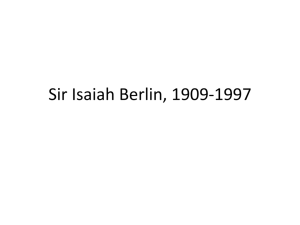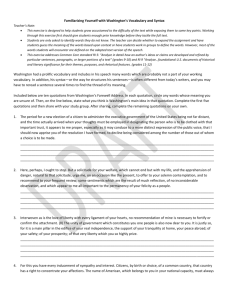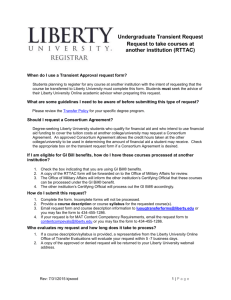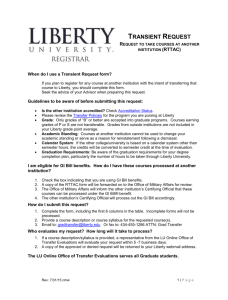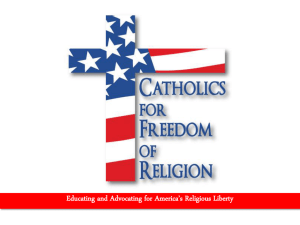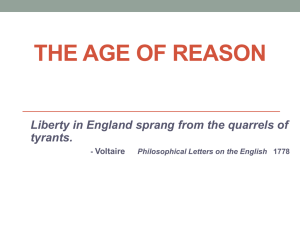Justice and Liberty in American Thought
advertisement
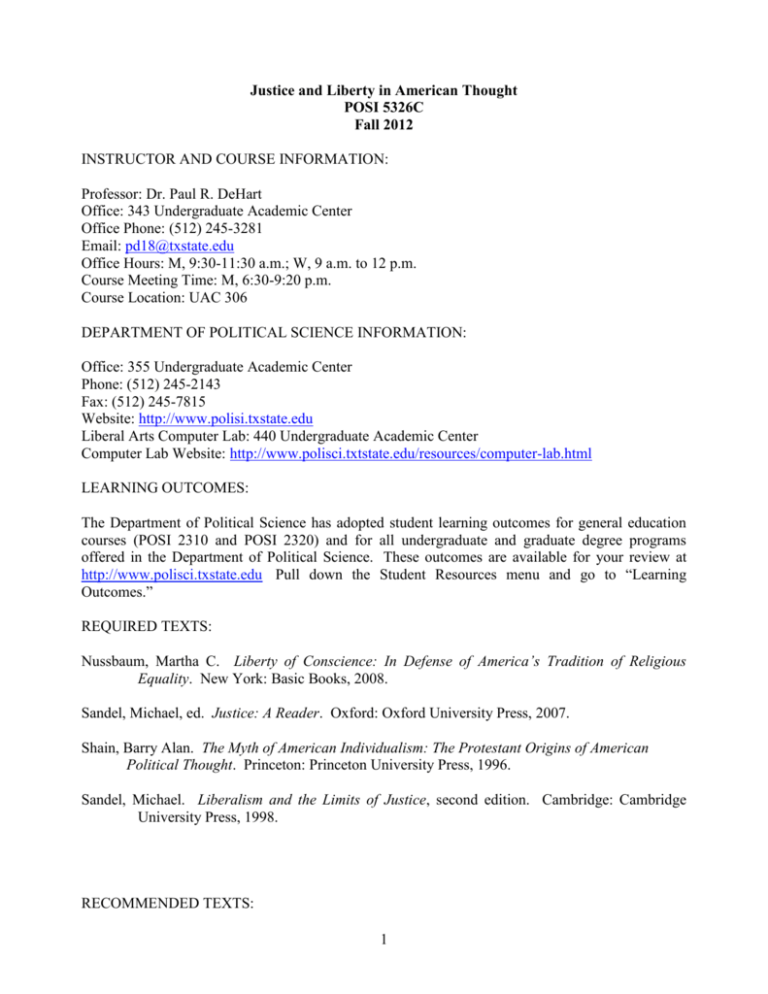
Justice and Liberty in American Thought POSI 5326C Fall 2012 INSTRUCTOR AND COURSE INFORMATION: Professor: Dr. Paul R. DeHart Office: 343 Undergraduate Academic Center Office Phone: (512) 245-3281 Email: pd18@txstate.edu Office Hours: M, 9:30-11:30 a.m.; W, 9 a.m. to 12 p.m. Course Meeting Time: M, 6:30-9:20 p.m. Course Location: UAC 306 DEPARTMENT OF POLITICAL SCIENCE INFORMATION: Office: 355 Undergraduate Academic Center Phone: (512) 245-2143 Fax: (512) 245-7815 Website: http://www.polisi.txstate.edu Liberal Arts Computer Lab: 440 Undergraduate Academic Center Computer Lab Website: http://www.polisci.txtstate.edu/resources/computer-lab.html LEARNING OUTCOMES: The Department of Political Science has adopted student learning outcomes for general education courses (POSI 2310 and POSI 2320) and for all undergraduate and graduate degree programs offered in the Department of Political Science. These outcomes are available for your review at http://www.polisci.txstate.edu Pull down the Student Resources menu and go to “Learning Outcomes.” REQUIRED TEXTS: Nussbaum, Martha C. Liberty of Conscience: In Defense of America’s Tradition of Religious Equality. New York: Basic Books, 2008. Sandel, Michael, ed. Justice: A Reader. Oxford: Oxford University Press, 2007. Shain, Barry Alan. The Myth of American Individualism: The Protestant Origins of American Political Thought. Princeton: Princeton University Press, 1996. Sandel, Michael. Liberalism and the Limits of Justice, second edition. Cambridge: Cambridge University Press, 1998. RECOMMENDED TEXTS: 1 Sandel, Michael. Justice: What’s the Right Thing to Do. New York: Farrar, Straus and Giroux, 2009. Hampton, Jean. Political Philosophy. Boulder, CO: Westview Press, 1996. CATALOG DESCRIPTION: An examination of the concepts of justice and liberty in American thought from the seventeenth century to the present. Attention will be given both to the nature of liberty and justice and to their practical requirement as understood by various American thinkers, including statesmen, reformers, social scientists, and philosophers. Credit Hours: 3.00 DESCRIPTION AND GOAL OF COURSE: This course seeks, as its primary objective, thoroughly to acquaint students with the concepts of justice and liberty (and their relation) as these concepts have been developed and employed in American political thought as well as in American political discourse. To that end this course examines justice and liberty and their relation at various stages of American political development from the Puritans to the present. One goal is to familiarize students with the way in which justice and liberty (and their relation) were understood at the foundations of the American Constitutional order. To that end, some attention is given to American writing during the settlement and founding period. Another goal of the course is to enable students to enter into contemporary debates about the nature and requirements of justice and the nature of and priority of liberty relative to other political values (i.e., What is the priority of liberty relative to justice, equality, community, or security?). To that end, important works by philosophers and political theorists from the twentieth and twenty first century are engaged. Yet another goal of this course is to enable students to engage the work of American theorists and political thinkers writing on justice and liberty by requiring written work of student that engages these works. OBJECTIVES OF COURSE: General Learning Objectives: This course seeks to . . . 1. Acquaint students with various ideas about the nature of justice and liberty that have been advanced in American thought. 2. Enable students to unearth the philosophical foundations of different concepts of justice and liberty and to trace out what is entailed or required by these different concepts. 3. Enable students to assess the merits of the various conceptions of justice and liberty on offer in American thought. Specific Behavioral Objectives: As a result of the activities and study in this course, the student should be able to . . . 2 1. Describe and evaluate the various conceptions of justice and liberty advanced in American thought. 2. Unearth and articulate the philosophical foundations and requirements or entailments of various conceptions of justice and liberty. 3. Evaluate the merits of the various conceptions of justice and liberty that one encounters in American thought. RESPONSIBILITIES OF STUDENTS: 1. To attend class. This includes arriving on time and staying for the duration of the class time. 2. To participate in class discussion regularly. 3. To be respectful of others in the room, which includes being civil when engaging in exchanges or debate with others and which includes refraining from any ad hominem argumentation. 4. To refrain from distracting others. All cell phones, pagers, etc., must be turned off during lecture and examinations. Students must not play games or do email or watch movies, etc. on electronic devices during class. Computers can only be used for taking notes. 5. To read assigned readings in advance of the day on which they will be discussed. 6. To complete all assignments and to turn them in at the assigned time. 7. To do his or her own work and to adhere to standards of scholastic integrity. EVALUATION: Minimum Requirements: Turning in all major assignments is a minimum condition for passing the course. Students who fail to turn in major assignments are therefore in danger of failing the course. Attendance: Attendance is essential to succeeding in this course. Consequently, attendance is used to resolve borderline grades. As well, attendance is used both to determine whether to curve a student’s grade and to determine the degree to which each students grade should be curved. Finally, more than 3 absences may result in a letter grade reduction in the course. Absenteeism may result in failing the course. To be counted in attendance, students must refrain from texting, playing games on electronic devices, doing email, interacting on social networking sites, and like activities. Participation: Student participation is also essential to succeeding in this class. Participation involves participating in class discussions as well as participating in any group activities prescribed by the instructor. Together with attendance, participation in the course is used to determine whether or not and by how much to curb a student’s final average for the course. Essays: Each student will write 3 essays over the course of the semester. Essays together comprise 100% of the overall course average. The highest two grades on essays will each comprise 40% of the overall average. The lowest essay grade will constitute 20% of the overall average for the course. Guidelines will be provided in class and must be followed in order for the student to receive full credit for the essay. Cheating: A student will automatically receive a zero on any assignment on which he or she is caught cheating and may receive a failing grade in the course pursuant to the procedures outlined in the Honor Code. 3 Grading Scale: A: 90-100 B: 80-89 C: 70-79 D: 60-69 F: 59 and below ACADEMIC INTEGRITY: Texas State University-San Marcos expects students to engage in all academic pursuits in a manner that is beyond reproach. Students found in violation of the Honor Code are subject to disciplinary action. To support the goal of maintaining a climate of academic honesty, Texas State has adopted a modified Honor Code. Read the full document U.P.P.S. No. 07.10.01 STUDENTS WITH DISABILITIES: Qualified students with disabilities are entitled to reasonable and appropriate accommodations in accordance with federal laws including Section 504 of the 1973 Rehabilitation Act and the 1990 Americans with Disabilities Act, and university policy UPPS 07.11.01 Disability Services. Recommended accommodations may included extended time on exams, tape recording of class lectures, use of a lap top computer in class to take notes, assistance with locating a volunteer note taker, sign language/oral interpreting services and captioning services. A faculty member may recommend an alternate accommodation as long as it is equally effective and achieves the same result. As a prerequisite to establishing the need for accommodations, Texas State requires the student provide documentation of disability to the Office of Disability Services (ODS). This documentation should be from a medical professional qualified to diagnosis the disability. Professional ODS staff will review the documentation according to university criteria to determine the student’s eligibility for accommodations. A student who is qualified by the ODS for accommodations is responsible for presenting an “Academic Accommodation Letter” and “Academic Accommodation Form” prepared by the ODS to each faculty member. Following a discussion of accommodations relevant to the course, the faculty member’s signature is obtained on the “Academic Accommodation Form.” The ODS will send a copy of the “Academic Accommodation Letter” either electronically or by hard copy to the faculty member within 24 hours after the student returns the documentation to ODS. 4 Course Calendar Note: Course Calendar subject to alteration at the Professor’s discretion Date M Aug 27 M Sep 3 M Sep 10 M Sep 17 M Sep 24 M Oct 1 M Oct 8 M Oct 15 M Oct 22 M Oct 29 M Nov 5 M Nov 12 Topic Introduction to course Labor Day Liberty in American Thought: Martha Nussbaum on Liberty of Conscience Liberty in American Thought: Martha Nussbaum on Liberty of Conscience Liberty in American Thought: Barry Alan Shain on Ordered Liberty Liberty in American Thought: Barry Alan Shain on Ordered Liberty Liberty in American Thought: Barry Alan Shain on Ordered Liberty The Background to Contemporary American Debates on Justice: John Locke and Classical Liberalism The Background to Contemporary American Debates on Justice: Utilitarianism vs. Kant Justice as Fairness: Deontological Liberalism and the Early John Rawls Libertarianism: Robert Nozick and the Critique of Rawls Theory of Justice Communitarianism: Michael Sandel’s Critique of Kantian Liberalism M Nov 19 Political Liberalism OR Rawls II Nov 21-23 M Nov 26 Thanksgiving Break Critiques of Rawls II M Dec 3 W Dec 12 Critiques of Rawls II Final Examination: 5-7:30 p.m. Assignment Syllabus No Class Nussbaum, Chapters 1 and 2 Nussbaum, Chapter 3 Shain, Chapters 1-2 Shain, Chapters 3-4 Shain, Chapters 5-6 Essay 1 Due Sandel, Justice, 84-96, 101-117 Sandel, Justice, 14-35, 161-167, 176-177, 180-183 Sandel, Justice, 203-226 Sandel, Justice, 60-73, 226-235 Sandel, Justice, 328-334 Essay 2 Due (Make use of Sandel, Liberalism and the Limits of Justice in Essay 2) Sandel, pp. 343-358. Recommended: Rawls, John. “The Priority of Right and Ideas of the Good.” Philosophy and Public Affairs 17, no. 4 (Autumn 1988): 251-276; Rawls, John. “Justice as Fairness: Political not Metaphysical.” Philosophy and Public Affairs 14, no. 3 (Summer 1985): 223251; and Rawls, John. “The Idea of an Overlapping Consensus.” Oxford Journal of Legal Studies Vol 7, No. 1 (Spring 1987): 1-25. (all on JSTOR) Hampton, Jean. “Should Political Philosophy be Done Without Metaphysics?” Ethics 99, no. 4 (July 1989): 791-814 (on JSTOR) Sandel, pp. 359-377. Essay 3 Due 5



